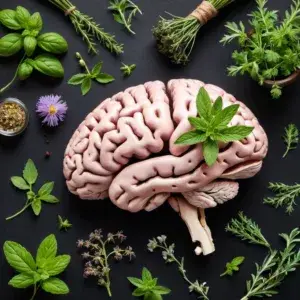Table of Contents
Where It Comes From
Ginkgo Biloba is extracted from the leaves of the Ginkgo tree, one of the world’s oldest living tree species, with fossils dating back more than 270 million years. Traditional Chinese medicine has used Ginkgo Biloba, a plant native to China, for centuries to treat a variety of health disorders, particularly those involving brain function and circulation. Due to its cognitive-enhancing and neuroprotective effects, people extensively utilize Ginkgo Biloba as a dietary supplement today.
What It is Indicated For
People primarily employ Ginkgo Biloba to aid memory, cognitive function, and general brain health. It is particularly popular among people looking to improve their mental clarity, focus, and cognitive ability, especially as they age. Ginkgo Biloba is also known for its ability to enhance blood circulation, which benefits both brain and cardiovascular health.
Key Benefits:
- Memory Improvement: Ginkgo Biloba has been demonstrated to improve memory, especially in elderly people and those with cognitive impairments. A study published in Psychopharmacology discovered that Ginkgo Biloba supplementation significantly enhanced memory and cognitive function in patients with age-related cognitive decline.
- Cognitive Function: Ginkgo Biloba promotes cognitive function by boosting blood flow to the brain, improving oxygen and nutrient delivery, and protecting neurons from oxidation. The Journal of the American Medical Association (JAMA) published a study that found Ginkgo Biloba to enhance cognitive performance and concentration in healthy older individuals.
- Neuroprotection: Ginkgo Biloba reduces oxidative stress, inflammation and protects against age-related neurodegeneration. According to a study published in Neurobiology of Aging, Ginkgo Biloba supplementation helps retain cognitive function and reduces the risk of Alzheimer’s disease in older people.
Contraindications
Most people typically find Ginkgo biloba safe, but those using blood thinners like warfarin or aspirin should use it with caution as it may increase the risk of bleeding. Additionally, people with epilepsy or who are prone to seizures should consult a healthcare provider before using Ginkgo Biloba, as it may lower the seizure threshold.
Warnings
While most people tolerate Ginkgo Biloba well, a few may develop moderate side effects such as headaches, dizziness, stomach discomfort, or allergic skin responses. It is critical to follow the prescribed dosage on the product label and consult with a healthcare expert if you have any concerns or pre-existing medical conditions.
Dosages
The typical dosage of Ginkgo Biloba ranges from 120 to 240 mg per day, standardized to contain 24% flavone glycosides and 6% terpene lactones. Clinical trials frequently employ doses in this range to obtain cognitive and neuroprotective advantages with minimal side effects. For memory enhancement and cognitive support, a daily dose of 120–240 mg is typically recommended, dispersed throughout the day.
Products Contained In
Qualia Mind: A powerful nootropic that contains Ginkgo Biloba to improve memory, focus, and overall cognitive performance.
Neuro-Peak: A brain health supplement containing Ginkgo Biloba that improves cognitive performance and mental clarity.
Brain Pill: A cognitive improvement supplement including Ginkgo Biloba to boost memory and brain health.
References
1. LeBars, P. L., Katz, M. M., Berman, N., Itil, T. M., Freedman, A. M., & Schatzberg, A. F. (1997). A placebo-controlled, double-blind, randomized trial of an extract of Ginkgo biloba for dementia. Journal of the American Medical Association (JAMA), 278(16), 1327–1332.
2. Mix, J. A., & Crews, W. D. (2000). An examination of the efficacy of Ginkgo biloba extract EGb 761 on the neuropsychological functioning of cognitively intact older adults. Psychopharmacology, 152(4), 403–412.
3. Solomon, P. R., Adams, F., Silver, A., Zimmer, J., & DeVeaux, R. (2002). Ginkgo for memory enhancement: A randomized controlled trial. Neurobiology of Aging, 23(3): 479–484.




